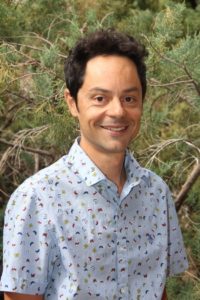 Andrea Achilli is an Assistant Professor in the Chemical and Environmental Engineering Department at the University of Arizona (UA) and affiliated faculty at the UA Water and Energy Sustainable Technology (WEST) Center. His main fields of research are membrane processes for desalination and water reuse, including membrane distillation and energy recovery. Additional research focuses on process integration, modelling, and optimization for water and wastewater treatments. Dr. Achilli is the principal investigator of several funded research projects focusing on membrane contactor processes, hybrid systems for desalination, and water reuse membrane processes.
Andrea Achilli is an Assistant Professor in the Chemical and Environmental Engineering Department at the University of Arizona (UA) and affiliated faculty at the UA Water and Energy Sustainable Technology (WEST) Center. His main fields of research are membrane processes for desalination and water reuse, including membrane distillation and energy recovery. Additional research focuses on process integration, modelling, and optimization for water and wastewater treatments. Dr. Achilli is the principal investigator of several funded research projects focusing on membrane contactor processes, hybrid systems for desalination, and water reuse membrane processes.
Read his Emerging Investigator article “Membrane Distillation and High Salinity: Analysis and Implications in Water” and read more about him in the interview below:
Your recent Emerging Investigator Series paper focuses on the analysis of membrane distillation for high salinity waters. How has your research evolved from your first article to this most recent article?
I started my PhD because of my passion on advanced wastewater treatment using membranes. Since then I have been increasingly focusing on desalination and water reuse, mainly because these systems are at the intersection between energy and water. There is a huge opportunity in managing concentrated waste streams from inland desalination and water reuse by realizing full resource recovery in wet streams.
What aspect of your work are you most excited about at the moment?
Interacting with talented PhD students. Without any doubts. They challenge me and they’re doing great research. I am very proud of the work they are putting out and how they shaped the lab in the past couple of years. In terms of research, I am very fortunate to work in a research center that was created to tackle water reuse challenges. There I can do research at different scales, from surface chemistry to operating pilot-scale systems 24/7, and I am also forming close collaborations outside of engineering.
In your opinion, what are the most important questions to be asked/answered in this field of research?
Overall, I think it goes back to the basics: how do we make sure that everybody has safe drinking water and a good environmental health? We just need to realize that the world we live in is rapidly changing. We are already observing large people displacement for various reasons and it is not going to decrease anytime soon. The water infrastructure is not designed for it. We need to move towards life support systems to support humans in harsh environments.
What do you find most challenging about your research?
In a relatively new lab, it took time to build a lab culture between all the members.
In which upcoming conferences or events may our readers meet you?
Because of the Covd19 disease I am not traveling much at the moment. Conferences I regularly contribute to are NAMS, the AEESP Conference, the Gordon Conference on Membranes, and the AMTA/AWWA Membrane Technology Conference.
How do you spend your spare time?
I like to be outdoor as much of possible and ride my bicycle, and spend time with my family. Now that I have a two-year son, I combine these activities towing Arturo around on his bike trailer from one Mexican pastries shop to the next J
Which profession would you choose if you were not a scientist?
My not so secret dream was to be as good and eloquent as Noam Chomsky. I love geopolitics and history, so that would have been a fun work and research area. Also, bike mechanic would have been another excellent choice.
Can you share one piece of career-related advice or wisdom with other early career scientists?
It may be cliché, but follow your passion, stick to your guns, and play your strengths. Also, treat everybody well. Then remember to breathe and be kind to your body, even when you are too busy. And perform the task you hate the most first, it makes the rest of your day much better.










